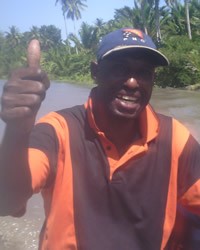Baramu in Papua New Guinea

Photo Source:
Jimmy Gomoga
|
Send Joshua Project a map of this people group.
|
| People Name: | Baramu |
| Country: | Papua New Guinea |
| 10/40 Window: | No |
| Population: | 1,700 |
| World Population: | 1,700 |
| Primary Language: | Baramu |
| Primary Religion: | Christianity |
| Christian Adherents: | 95.00 % |
| Evangelicals: | 22.00 % |
| Scripture: | Portions |
| Ministry Resources: | No |
| Jesus Film: | No |
| Audio Recordings: | No |
| People Cluster: | New Guinea |
| Affinity Bloc: | Pacific Islanders |
| Progress Level: |
|
Introduction / History
The name Baramu covers three tribes: the eastern tribe Odag or Odai (Yahud) composed of Madame, Wederehiamo, Tirio (Madir) villages, the middle tribe (Levi) composed of Baramu and Tapila villages and the western tribe (Benei) composed of Lewada, Suame and Bitur villages. About the mid-century, the Baramu speaking tribes were reduced to just one (1) village that had only one (1) long house due to the battles against the neighboring tribes. To the east with the Kiwai (Zebus) speaking tribes, to the west with Suki (Kamakaram) and Bine speaking tribes (Benei) who called themselves "Headhunters" and to the south with Gidra and Abom speaking tribes. The three (3) Baramu speaking tribes combined as one (1) man and eventually drove out the warriors from the east and the southern tribes and with the help from the Gogodala warriors, Baramu speaking tribe eventually subdued the Headhunters at Kaisaware, Zair (Somogi) Island and saved Weredai or Were (Kiunum) speaking tribe from been annihilated from the tribes in Western Province.
From oral histories, the Baramu speaking ancestors were part of the other tribes, the Gogodala to the north across the fly river, Kiwai to the east, the Weredai or Were and Suki (Kamakaram) towards the west and the Bine, Gidra and Abom speaking tribes to the south. Baramu speakers trace their lineage to the original members of the tribe who settled in the area after the break away from Iyasa or Isa (Israel) and Samari (Samara) villages, Kiwai Islands. All of the tribes in Western Province trace their lineage to the two (2) boats which their ancestors used to travel to Western Province, Papua New Guinea (Wilde 2004). It is said that these original boats are still intact, but hidden (Gomoga 2007).
The Baramu tribes have a tribe-based kinship system and trace their origins to the three (3) tribes said to originate from their ancestors (Wilde 2004). It is said that when King Solomon knew that Jerusalem was to be destroyed, he ordered eleven (11) copies of the Ark of the Covenant Box be made and filled with gold, brass and iron. These copies with the original were put on twelve (12) boats and sent across the globe. Three (3) boats were destined for Papua New Guinea, however, only two (2) made it because one (1) sunk at the port of departure (Gomoga 2007).
Within each of the three (3) tribes, people are further divided into eight (8)-clans, which trace their lineage back to the primary ancestors and tribes. The premise of this tribal system is a marriage practice that continues to be organized along the lines of a prescribed tribe exchange system adhering to bloodlines and referred to as 'sister-exchange and the men are not allowed to intermarry within their own tribes but are allowed to take wives from the other two (2) tribes and exchange sisters. The bloodlines are kept sacred (Wilde 2004, Gomoga 2007).
The eight (8) clans are divided according to the tribes, the Umaidi and Pidimo clans belong to the Odag or Odei tribe (Yahud), Idudmo, Bugumo and Ebaimo clans belong to the middle tribe (Levi) and Binamon, Banarom and Tapamo clans belong to the western tribe (Benei) (Gomoga 2007).
Where Are they Located?
These tribes are located on the southern banks of the Fly River, between Kouoro and Bitur rivers.
What Are Their Lives Like?
The Baramu speaking people use dugout outrigger canoes for everyday activities such as fishing, hunting and transportation and until the mid-twentieth century, the tribes and clans living in villages typically consisted of a single communal thatched-roof longhouse. Today they live in villages.
What Are Their Beliefs?
They believe they are part of the tribes of Israel who were sent out by King Solomon to hid the Ark Covenant Box. When the first missionaries (UFM) came the elders recognised the history of the Israelis and how God helped them and led them through the desert, but the Gospel was half the real truth and they rejected it. The people are still waiting for God to visit them and take them home.
Prayer Points
Pray that God will once again visit them.